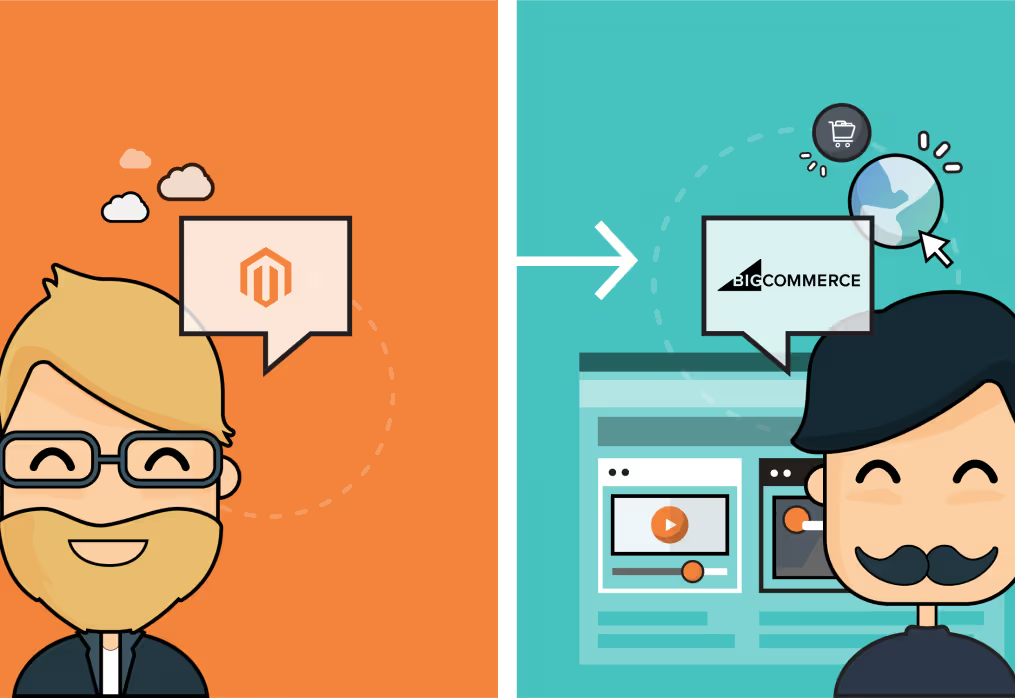5 Things on Magento Enterprise vs BigCommerce Enterprise

It was four years ago when I first looked into SaaS eCommerce platforms like BigCommerce. In the past, migrations usually went the other way—moving BigCommerce sites to Magento for its robust feature set and flexibility.
However, in recent years I’ve noticed the reverse trend: businesses are moving from self-hosted platforms like Magento to cloud-based solutions like BigCommerce.
It’s not surprising. Working closely with BigCommerce (and Moustache) lately, we’ve seen how much the platform has matured. With a recent $64 million growth equity investment led by Goldman Sachs, BigCommerce’s development roadmap is accelerating. Combine that with existing enterprise-level functionality, and BigCommerce Enterprise is now a serious contender for Magento Enterprise (v1.x) merchants considering an upgrade.
Having migrated sites in both directions, I’d like to share my recent experiences working with these platforms. Hopefully this provides guidance for merchants weighing the move.
Improvements You’ll See Migrating to BigCommerce Enterprise
Simplicity
Your marketing team will love the ease of product creation, promotional rule management, order handling, and content page creation.
Promotional rules, in particular, have been a nightmare in Magento. Its backend is so cluttered that even seasoned pros make mistakes. BigCommerce simplifies this dramatically, making day-to-day management far easier.
Peace of Mind
Hosting and security are no longer your problem—which is a big deal for larger retailers.
With Magento (non-cloud versions), merchants must constantly optimise and maintain hosting infrastructure while meeting PCI compliance. Fail to patch regularly, and it’s only a matter of time before you get hacked.
BigCommerce eliminates this headache by providing a fully controlled PCI-compliant infrastructure, so hosting and security are handled for you.
Ever Improving
BigCommerce is constantly innovating, and with that extra $64 million in the bank, you get the benefit of ongoing development. Feature upgrades roll out automatically as part of your subscription—no extra work needed.
Magento also releases improvements, but upgrades are the merchant’s responsibility. Given the complexity of some major upgrades, many merchants delay or skip them, leaving their sites outdated.
Things to Be Aware Of Before Migrating
Multiple Websites
As of May 1, BigCommerce still doesn’t offer native multiple-website support like Magento. Each BigCommerce store runs as a standalone instance.
If you operate more than five clone sites, keeping promotional rules, banners, and stock levels in sync can be time-consuming.
- Large enterprises often use a PIM (Product Information Management) tool to sync product data across sites.
- Smaller businesses can rely on third-party apps, though these are rarely as seamless as Magento’s native support.
If multiple websites are critical to your business, carefully evaluate available solutions before making the switch.
Platform Limitations
Migrating from open-source to SaaS requires a mindset shift.
With Magento, businesses with decent budgets often customise heavily—when you can modify the source code, the possibilities are endless. BigCommerce, as a SaaS platform, doesn’t give you source-code access. Instead, you customise the frontend look and feel and extend functionality through the API.
That means certain limitations are unavoidable. For example, BigCommerce doesn’t natively support grouped or bundled products. If you rely on these in Magento, you’ll need to use product options and frontend workarounds to replicate the experience.
Final Thoughts
It’s only natural that SaaS eCommerce solutions will continue to take over. But there are still limitations today, so make sure you understand them and plan accordingly before migrating.
Making the decision is just the first step - you’ll also need a proper migration plan.
I’ll be sharing more lessons from migration projects in a future article. In the meantime, feel free to leave a comment if you have questions or thoughts about eCommerce platforms.

.svg)

